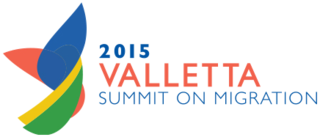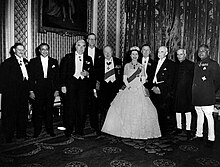The Commonwealth Heads of Government Meeting is a biennial summit meeting of the governmental leaders from all Commonwealth nations. Despite the name, the head of state may be present in the meeting instead of the head of government, especially among semi-presidential states. Every two years the meeting is held in a different member state and is chaired by that nation's respective prime minister or president, who becomes the Commonwealth Chair-in-Office until the next meeting. Queen Elizabeth II, who was the Head of the Commonwealth, attended every CHOGM beginning with Ottawa in 1973 until Perth in 2011, although her formal participation only began in 1997. She was represented by the Prince of Wales at the 2013 meeting as the 87-year-old monarch was curtailing long-distance travel. The Queen attended the 2015 summit in Malta and the 2018 summit in London, but was represented again by the Prince of Wales at the 2022 meeting in Rwanda.

A Commonwealth realm is a sovereign state in the Commonwealth of Nations whose monarch and head of state is shared among the other realms. Each realm functions as an independent state, equal with the other realms and nations of the Commonwealth. King Charles III succeeded his mother, Queen Elizabeth II, as monarch of each Commonwealth realm following her death on 8 September 2022. He simultaneously became Head of the Commonwealth.
Chief Emeka Anyaoku, GCVO, CFR, CON is a Nigerian diplomat of Igbo descent. He was the third Commonwealth Secretary-General. Born in Obosi, Anyaoku was educated at Merchants of Light School, Oba, and attended the University College of Ibadan, then a college of the University of London, from which he obtained an honours degree in Classics as a College Scholar. Aside from his international career, Chief Anyaoku continues to fulfill the duties of his office as Ichie Adazie of Obosi, a traditional Ndichie chieftainship.

The head of the Commonwealth is the ceremonial leader who symbolises "the free association of independent member nations" of the Commonwealth of Nations, an intergovernmental organisation that currently comprises 56 sovereign states. There is no set term of office or term limit and the role itself involves no part in the day-to-day governance of any of the member states within the Commonwealth. The position is currently held by King Charles III.

The National Security Council is a federal institutional and consultative body chaired by the Prime Minister of Pakistan as its chairman. The NSC is a principal forum that is mandated for considering national security and foreign policy matters with the senior national security advisers and Cabinet ministers. The idea and inception of National Security Council was first conceived in 1969 under the President Yahya Khan, its functions were to advise and assist the president and prime minister on national security and foreign policies.

Vengalil Krishnan Krishna Menon was an Indian academic, politician, and non-career diplomat. He was described by some as the second most powerful man in India, after the first Prime Minister of India, Jawaharlal Nehru. He wrote the first draft of the Preamble to the Constitution of India, initiated the idea of the Constituent Assembly of India and was the architect, and the person who coined the name, of the Non-Aligned Movement.
The 1971 Commonwealth Heads of Government Meeting, officially known as the I Commonwealth Heads Meeting, and commonly known as Singapore 1971, was the first Meeting of the Heads of Government of the Commonwealth of Nations. It was held from 14 to 22 January 1971 in Singapore, and was hosted by that country's Prime Minister, Lee Kuan Yew.

Relations between Algeria and Pakistan are excellent. Pakistan was one of the first countries to recognize the Provisional Government of Algerian Republic and its mission was opened in Karachi, the then capital of Pakistan in 1958. Both sides have convergence of views on issues of international importance. Both countries have also been supporting each other in various multilateral forums including UN, OIC and NAM. Algeria has an embassy in Islamabad and Pakistan has an embassy in Algiers.
The 1973 Commonwealth Heads of Government Meeting, officially known as the II Commonwealth Heads Meeting, and commonly known as Ottawa 1973, was the second Meeting of the Heads of Government of the Commonwealth of Nations. It was held from 2 to 10 August 1973 in Ottawa, and hosted by Prime Minister Pierre Trudeau.

The 2013 Commonwealth Heads of Government Meeting was the 23rd Meeting of the Heads of Government of the Commonwealth of Nations. It was held in Colombo, Sri Lanka, from 15 to 17 November 2013. Commonwealth leaders agreed on Sri Lanka as the 2013 host for the meeting when they met in Port of Spain, Trinidad and Tobago, in 2009. Sri Lanka, which was originally slated to host the summit in 2011, was accused of committing atrocities during the Sri Lankan civil war and the summit was instead held in Perth, Australia; Colombo was given the 2013 summit instead. The leaders of Canada, Mauritius, and India boycotted the summit, citing alleged human rights violations by Sri Lanka against its Tamil minority. Protests were also banned during the summit. President Mahinda Rajapaksa summarised the summit's events as: "Issues covered in the communique include development, political values, global threats, challenges and Commonwealth cooperation." However, the meeting was overshadowed by controversy over Sri Lanka's human rights record and the alleged war crimes during the final stages of the civil war. This was the first time in 40 years that the Head of the Commonwealth, Queen Elizabeth II, was not present at the CHOGM.

From 1947 to 1956, the Dominion of Pakistan was a self-governing country within the Commonwealth of Nations that shared a monarch with the United Kingdom and the other Dominions of the Commonwealth. The monarch's constitutional roles in Pakistan were mostly delegated to a vice-regal representative, the governor-general of Pakistan.
The 1969 Commonwealth Prime Ministers' Conference was the 17th Meeting of the Heads of Government of the Commonwealth of Nations. It was held in the United Kingdom in January 1969, and was hosted by that country's Prime Minister, Harold Wilson.

The 1952 Commonwealth Prime Ministers' Economic Conference was an emergency Meeting of the Heads of Government of the British Commonwealth. It was called by the British government of Sir Winston Churchill and held in the United Kingdom in December 1952 as a follow-up to a Commonwealth Finance Minister's conference held in January 1952. The conference was held in the context of British economic and military decline and the United States' surging role in the world.
The 1953 Commonwealth Prime Ministers' Conference was the sixth Meeting of the Heads of Government of the Commonwealth of Nations. It was held in the United Kingdom in June 1953 on the occasion of the coronation of Queen Elizabeth II, and was hosted by that country's Prime Minister, Sir Winston Churchill.
The 1957 Commonwealth Prime Ministers' Conference was the ninth Meeting of the Heads of Government of the Commonwealth of Nations. It was held in the United Kingdom in June 1957, and was hosted by that country's Prime Minister, Harold Macmillan.

The 1960 Commonwealth Prime Ministers' Conference was the tenth Meeting of the Heads of Government of the Commonwealth of Nations. It was held in the United Kingdom in May 1960, and was hosted by that country's Prime Minister, Harold Macmillan.
The 1956 Commonwealth Prime Ministers' Conference was the eighth Meeting of the Heads of Government of the Commonwealth of Nations. It was held in the United Kingdom in June 1956, and was hosted by that country's Prime Minister, Sir Anthony Eden.

The 2015 Commonwealth Heads of Government Meeting, also known as CHOGM 2015 was the 24th Meeting of the Heads of Government of the Commonwealth of Nations. It was held in Malta from 27 to 29 November. Sri Lankan President Maithripala Sirisena handed the position of Commonwealth Chair-in-Office to Maltese prime minister Joseph Muscat at the meeting.

The Valletta Summit on Migration, also called the Valletta Conference on Migration, was a summit held in Valletta, Malta, on 11–12 November 2015, in which European and African leaders discussed the European migrant crisis. The summit resulted in the EU setting up an Emergency Trust Fund to promote development in Africa, in return for African countries to help out in the crisis.

Seventh Summit Conference of Heads of State or Government of the Non-Aligned Movement on 7–12 March 1983 took place in New Delhi in India, one of the founders and leading members of the Non-Aligned Movement. The summit followed the 1979 summit in Havana, Cuba at which confrontation between moderate member states led by SFR Yugoslavia and India and radical states led by Cuba led the movement into crisis. The keynote address delivered by Prime Minister of India Indira Gandhi. At the summit in New Delhi Bahamas, Barbados, Colombia and Vanuatu were admitted as new member states, Papua New Guinea, Antigua and Barbuda as observers and Dominican Republic as an guest state. Cambodia was absent from the meeting due to rival delegations controversy, Saint Lucia failed to send a delegation while Luxembourg's request for an guest status was rejected on formalistic deadline grounds. 1,500 journalists followed the event.












